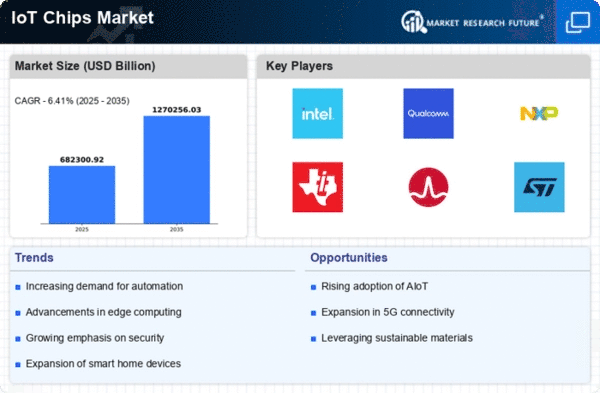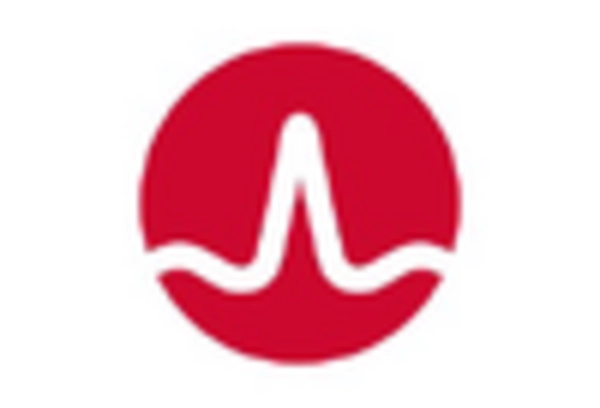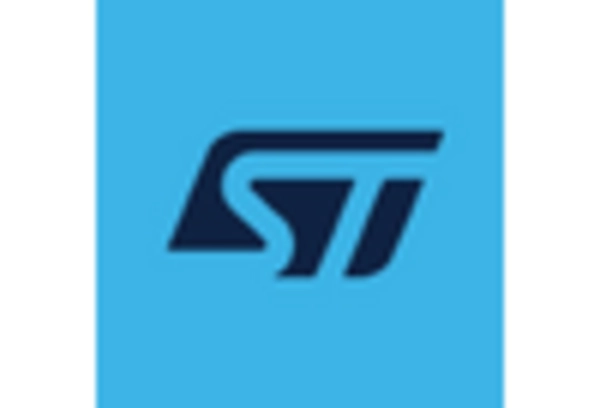Expansion of 5G Networks
The rollout of 5G networks significantly influences the Global IoT Chips Market Industry, as it enables faster data transmission and lower latency. This technological advancement facilitates the deployment of more sophisticated IoT applications across various sectors, including healthcare, automotive, and smart cities. As 5G technology becomes more widespread, the demand for IoT chips that can support these high-speed connections is expected to surge. The market's growth trajectory is anticipated to align with the increasing adoption of 5G, potentially contributing to a market valuation of 75 USD Billion by 2035.
Market Growth Projections
The Global IoT Chips Market Industry is poised for substantial growth, with projections indicating a market size of 28.4 USD Billion in 2024 and an anticipated increase to 75 USD Billion by 2035. This growth trajectory reflects the increasing adoption of IoT technologies across various sectors, including healthcare, manufacturing, and smart cities. The compound annual growth rate of 9.22% from 2025 to 2035 underscores the industry's potential for expansion, driven by factors such as technological advancements, rising consumer demand, and supportive government policies.
Rising Demand for Smart Devices
The Global IoT Chips Market Industry experiences a robust increase in demand for smart devices, driven by the proliferation of connected technologies. As consumers and businesses alike seek enhanced automation and efficiency, the need for IoT chips becomes paramount. In 2024, the market is projected to reach 28.4 USD Billion, reflecting a growing trend towards smart home devices, wearables, and industrial IoT applications. This demand not only fosters innovation in chip design but also encourages manufacturers to optimize performance and energy efficiency, thereby expanding the market's potential.
Government Initiatives and Funding
Government initiatives aimed at promoting IoT technology play a crucial role in shaping the Global IoT Chips Market Industry. Various countries are investing in smart infrastructure and digital transformation projects, which necessitate the integration of IoT chips. For instance, funding for smart city projects and industrial automation initiatives encourages the development and deployment of IoT solutions. These investments not only stimulate market growth but also create a favorable environment for innovation. As a result, the industry is likely to witness a compound annual growth rate of 9.22% from 2025 to 2035.
Increased Focus on Energy Efficiency
The Global IoT Chips Market Industry is increasingly influenced by the emphasis on energy efficiency and sustainability. As environmental concerns gain prominence, manufacturers are compelled to design IoT chips that consume less power while maintaining high performance. This shift not only aligns with global sustainability goals but also appeals to consumers and businesses seeking cost-effective solutions. The integration of energy-efficient IoT chips can lead to significant reductions in operational costs, thereby enhancing the attractiveness of IoT applications across various sectors. This trend is expected to bolster market growth in the coming years.
Advancements in Artificial Intelligence
The integration of artificial intelligence (AI) into IoT devices is transforming the Global IoT Chips Market Industry. AI enhances the capabilities of IoT applications, enabling smarter decision-making and automation. As AI technologies continue to evolve, the demand for IoT chips that can support complex algorithms and data processing is likely to increase. This synergy between AI and IoT not only drives innovation but also opens new avenues for market expansion. The potential for AI-driven IoT solutions is vast, suggesting a promising future for the industry as it adapts to these technological advancements.
















Leave a Comment